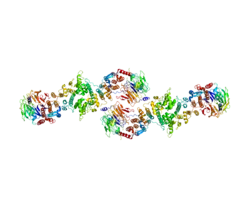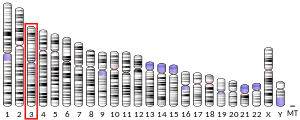Protein SEC13 homolog is a protein that in humans is encoded by the SEC13 gene.[5][6]
The protein encoded by this gene belongs to the SEC13 family of WD-repeat proteins. It has similarity to the yeast SEC13 and SEC31 proteins, which are required for vesicle biogenesis from the endoplasmic reticulum during the transport of proteins.[6]
References
- 1 2 3 GRCh38: Ensembl release 89: ENSG00000157020 - Ensembl, May 2017
- 1 2 3 GRCm38: Ensembl release 89: ENSMUSG00000030298 - Ensembl, May 2017
- ↑ "Human PubMed Reference:". National Center for Biotechnology Information, U.S. National Library of Medicine.
- ↑ "Mouse PubMed Reference:". National Center for Biotechnology Information, U.S. National Library of Medicine.
- ↑ Swaroop A, Yang-Feng TL, Liu W, Gieser L, Barrow LL, Chen KC, Agarwal N, Meisler MH, Smith DI (Jan 1995). "Molecular characterization of a novel human gene, SEC13R, related to the yeast secretory pathway gene SEC13, and mapping to a conserved linkage group on human chromosome 3p24-p25 and mouse chromosome 6". Hum Mol Genet. 3 (8): 1281–6. doi:10.1093/hmg/3.8.1281. PMID 7987303.
- 1 2 "Entrez Gene: SEC13 SEC13 homolog (S. cerevisiae)".
Further reading
- Shaywitz DA, Orci L, Ravazzola M, et al. (1995). "Human SEC13Rp functions in yeast and is located on transport vesicles budding from the endoplasmic reticulum". J. Cell Biol. 128 (5): 769–77. doi:10.1083/jcb.128.5.769. PMC 2120388. PMID 7876304.
- Maruyama K, Sugano S (1994). "Oligo-capping: a simple method to replace the cap structure of eukaryotic mRNAs with oligoribonucleotides". Gene. 138 (1–2): 171–4. doi:10.1016/0378-1119(94)90802-8. PMID 8125298.
- Andersson B, Wentland MA, Ricafrente JY, et al. (1996). "A "double adaptor" method for improved shotgun library construction". Anal. Biochem. 236 (1): 107–13. doi:10.1006/abio.1996.0138. PMID 8619474.
- Yu W, Andersson B, Worley KC, et al. (1997). "Large-scale concatenation cDNA sequencing". Genome Res. 7 (4): 353–8. doi:10.1101/gr.7.4.353. PMC 139146. PMID 9110174.
- Suzuki Y, Yoshitomo-Nakagawa K, Maruyama K, et al. (1997). "Construction and characterization of a full length-enriched and a 5'-end-enriched cDNA library". Gene. 200 (1–2): 149–56. doi:10.1016/S0378-1119(97)00411-3. PMID 9373149.
- Mammoto A, Sasaki T, Kim Y, Takai Y (2000). "Physical and functional interaction of rabphilin-11 with mammalian Sec13 protein. Implication in vesicle trafficking". J. Biol. Chem. 275 (18): 13167–70. doi:10.1074/jbc.C000096200. PMID 10747849.
- Tang BL, Zhang T, Low DY, et al. (2000). "Mammalian homologues of yeast sec31p. An ubiquitously expressed form is localized to endoplasmic reticulum (ER) exit sites and is essential for ER-Golgi transport". J. Biol. Chem. 275 (18): 13597–604. doi:10.1074/jbc.275.18.13597. PMID 10788476.
- Strausberg RL, Feingold EA, Grouse LH, et al. (2003). "Generation and initial analysis of more than 15,000 full-length human and mouse cDNA sequences". Proc. Natl. Acad. Sci. U.S.A. 99 (26): 16899–903. Bibcode:2002PNAS...9916899M. doi:10.1073/pnas.242603899. PMC 139241. PMID 12477932.
- Gevaert K, Goethals M, Martens L, et al. (2004). "Exploring proteomes and analyzing protein processing by mass spectrometric identification of sorted N-terminal peptides". Nat. Biotechnol. 21 (5): 566–9. doi:10.1038/nbt810. PMID 12665801. S2CID 23783563.
- Enninga J, Levay A, Fontoura BM (2003). "Sec13 shuttles between the nucleus and the cytoplasm and stably interacts with Nup96 at the nuclear pore complex". Mol. Cell. Biol. 23 (20): 7271–84. doi:10.1128/MCB.23.20.7271-7284.2003. PMC 230331. PMID 14517296.
- Ota T, Suzuki Y, Nishikawa T, et al. (2004). "Complete sequencing and characterization of 21,243 full-length human cDNAs". Nat. Genet. 36 (1): 40–5. doi:10.1038/ng1285. PMID 14702039.
- Bouwmeester T, Bauch A, Ruffner H, et al. (2004). "A physical and functional map of the human TNF-alpha/NF-kappa B signal transduction pathway". Nat. Cell Biol. 6 (2): 97–105. doi:10.1038/ncb1086. PMID 14743216. S2CID 11683986.
- Loïodice I, Alves A, Rabut G, et al. (2005). "The entire Nup107-160 complex, including three new members, is targeted as one entity to kinetochores in mitosis". Mol. Biol. Cell. 15 (7): 3333–44. doi:10.1091/mbc.E03-12-0878. PMC 452587. PMID 15146057.
- Gerhard DS, Wagner L, Feingold EA, et al. (2004). "The status, quality, and expansion of the NIH full-length cDNA project: the Mammalian Gene Collection (MGC)". Genome Res. 14 (10B): 2121–7. doi:10.1101/gr.2596504. PMC 528928. PMID 15489334.
- Rual JF, Venkatesan K, Hao T, et al. (2005). "Towards a proteome-scale map of the human protein-protein interaction network". Nature. 437 (7062): 1173–8. Bibcode:2005Natur.437.1173R. doi:10.1038/nature04209. PMID 16189514. S2CID 4427026.
- Stagg SM, Gürkan C, Fowler DM, et al. (2006). "Structure of the Sec13/31 COPII coat cage". Nature. 439 (7073): 234–8. Bibcode:2006Natur.439..234S. doi:10.1038/nature04339. PMID 16407955. S2CID 2426465.
This article is issued from Wikipedia. The text is licensed under Creative Commons - Attribution - Sharealike. Additional terms may apply for the media files.





